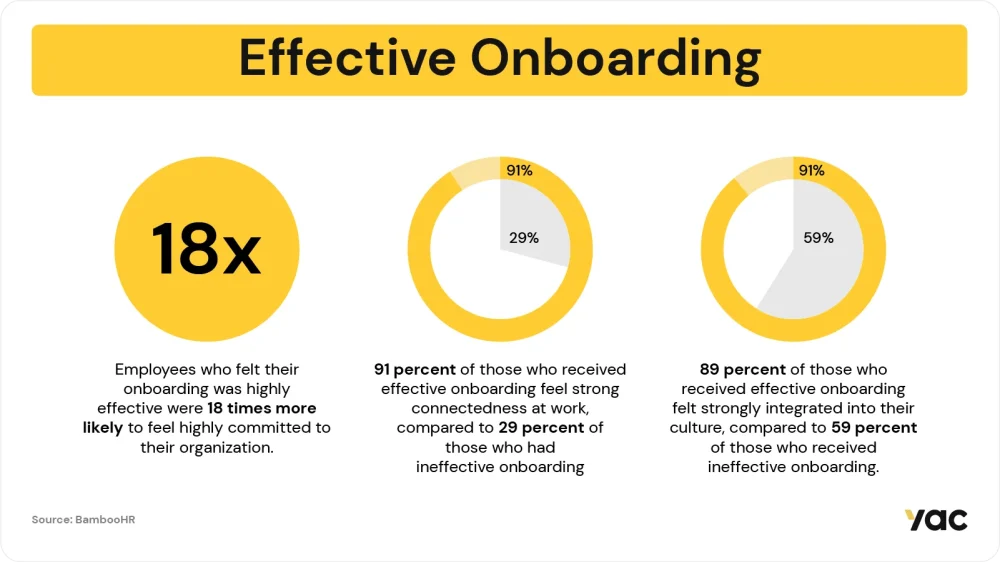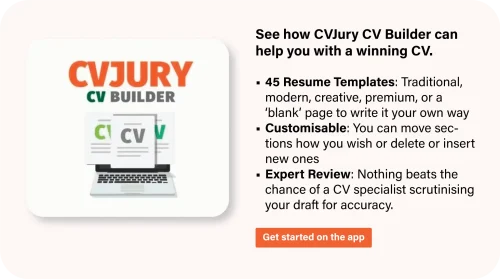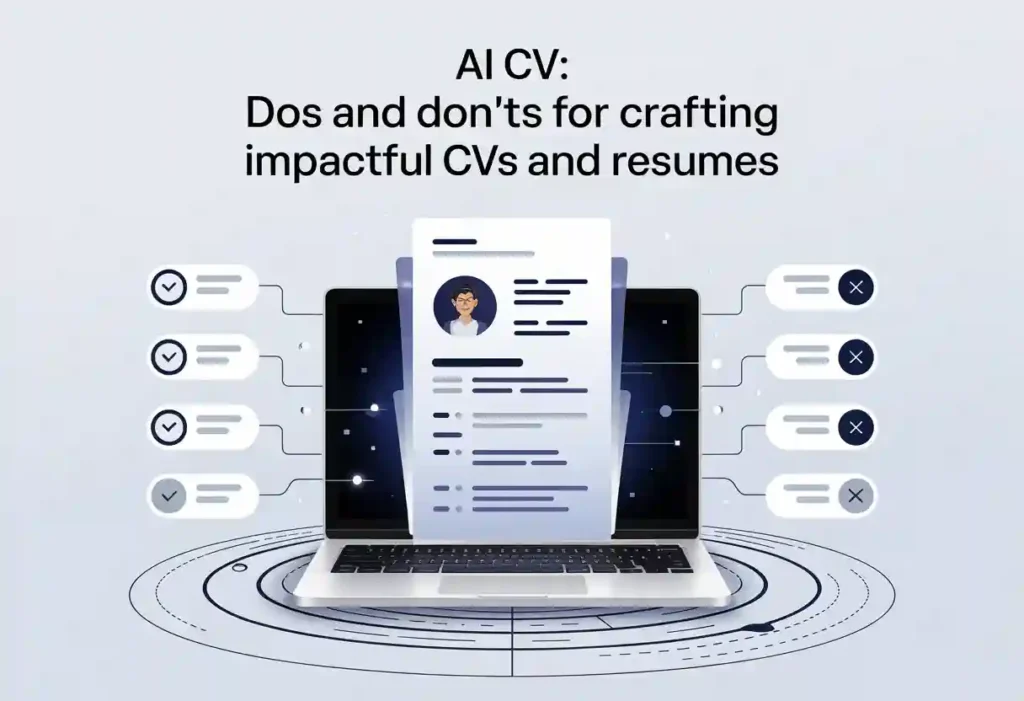Acing Interviews with the 30-60-90-Day Plan Advantage
This article shows why presenting an excellent 30-60-90-day plan before the interviewers can be a powerful, impressive tool for boosting your interview success and job-landing chances.
Having this plan will show that you are very serious about building a prosperous future with what will hopefully be your new colleagues.
However, you must tailor the plan to the particular role and company you are applying to join. Outline your goals and key objectives for accomplishing them in the first 90 days of your new role.
You will set yourself apart from the other interviewers by showing that you know the company well and can set goals and clear expectations.
We’re going to answer three key questions:
- What is the 30-60-90-day plan?
- How do you write a 30- 60- 90-day plan for an interview?
- When should you discuss your 30- 60- 90-day plan with an interviewer?
Meanwhile, below are four specific tips for writing an excellent 30- 60- 90-day plan:
- Research. Dig deeper to know what the company does, and its culture, goals, reputation, and corporate social responsibilities. The more you know these, the better you can tailor your content.
- Be specific. Saying I want to “learn the ropes,” “get up to speed,” or “hit the ground running” will not cut it. Instead, list particular tasks and goals you plan to meet every 30 days.
- Be realistic. No need to set yourself up for failure by setting unrealistic goals. Instead, be measurable. Your goals should be specific, measurable, achievable, relevant, and time-bound (SMART). Such an approach will help you to monitor your progress and stay on track.
- Be positive. Your plan should exude an upbeat and enthusiastic spirit. This will make the interviewers believe you are excited about the role and confident that you can succeed.

Expert Advice For Interview Success
You’ve passed the first hurdle. Your resume passed the first round, and you’ve been granted an interview.
But now what? With so many job seekers out there, the competition is pretty stiff. You know that this interview could be the make-or-break of your career.
You need to impress. You must make the interviewer understand that you are what they want and their company needs.
But how do you do that? How do you dazzle your interviewer and leave the room with them ready to send you a job offer? You can do several things to increase your chances of getting the job.
We’ve included these four interview preparation tips in this article. They will help you impress the hiring manager.
Do your research. Read the company’s history and acquaint yourself with its mission, culture, and values. Most importantly, get to know the company. What products and services do they offer?
What have they achieved since they were founded? New employees who show familiarity with the company and its past can impress interviewers.
Make a great first impression. It is human nature to judge a book by its cover. And so, whether they want to admit it or not, any hiring manager will size you up when you walk in the door. This instant judgment will be based on your punctuality, appearance, and even how you enter the room.
Therefore, show up on time, dress to fit the purpose, and enter the room with a smile. Remember that those around you will automatically feel confident in your abilities if you exude confidence.
Be yourself. Always be honest and open about who you are. Do not try to be someone you are not. Remember that putting up a façade for a 45-minute interview may be easy.
But doing so will be more challenging for the rest of your career. And it will be even more difficult while under the stress of getting to grips with your new job responsibilities and finding your feet in your new role.
Be genuine and authentic. Show the interviewer who you are: your personality, values, and interests.
Drive the interview from the start. This is where your 30- 60- 90-day plan becomes very important. Prepare a 90-day plan that answers any questions posed and requirements made in the job description. This way, you’ll supply the answers the interviewer needs without being asked.
Tip
Make an effort to connect with a few of the company’s current employees on LinkedIn. In this way, you can get some inside information. You could learn about the company culture, the current employees, and advice on approaching the hiring manager.
Talk to more than one staff member if possible, but remember to do this cautiously and respectfully.
Remember that discretion should be the top priority when connecting with existing employees. Some people won’t be comfortable discussing their employer with a stranger.
However, you can use our LinkedIn message request tips to increase your chances of getting a positive response. CVJury can help you get your dream job.
Visit our Jobs Blog for practical interview tips and advice.
What Is The 30- 60- 90-Day Plan?
Based on the job details, this plan outlines your actions and intentions for the first three months with the company.
This plan should also demonstrate your understanding of the company’s culture, mission, industry, and customers’ wants and needs.
The plan breaks your first three months of employment down into 30-day (one-month) intervals.
Each interval should include your goals and how you aim to meet them.
It should also clarify how you will benefit the company or organization you’re interviewing for.
Here’s a 30-60-90-day plan interview template you can start with. Use our free online resume builder to create your resume fast.
And read our best article on resume builders and templates.
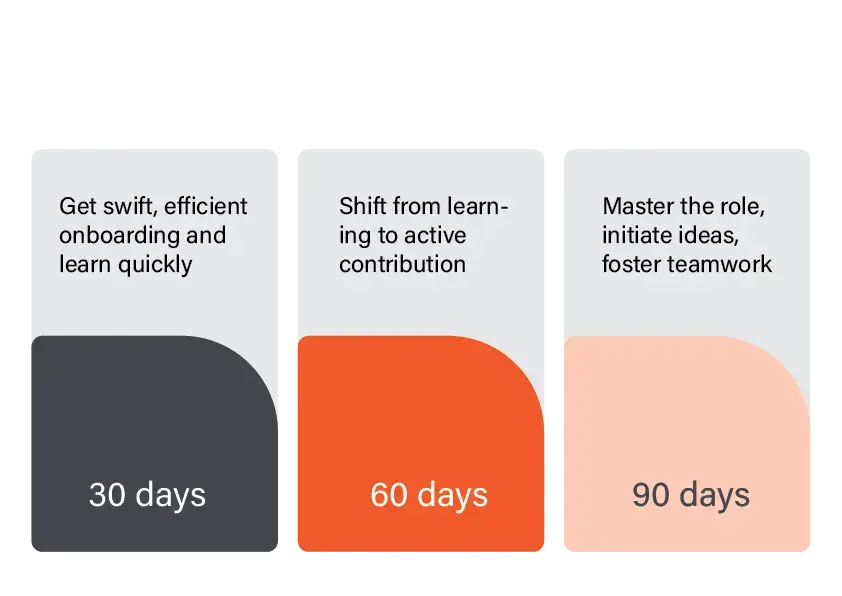
How To Write a 30- 60- 90-Day Plan
To write an excellent 30-to 60-day to 90-day plan, you must understand the job requirements and what the company is looking for. Most of the required information should be in the job description.
However, you can also visit the company’s website and get extra pointers by contacting company staff via LinkedIn or email. But be sure to remember to do so discreetly.
On average, you should write about one page for each 30-day plan section.
This is your opportunity during the interview stage to truly show your potential new manager that you are the best candidate for the job. The perfect 90-day plan will give the hiring manager a better understanding of your abilities and whether you can fill your new role.
You can use this as an opportunity to show off your skills. This will gauge your ability to prioritize, set critical goals, and strategize to achieve success.
Top Tip
A 30-60-90-day plan is more than just a one-size-fits-all solution. You must write a tailored strategy for every position and company you apply to.
Ensure you grab your target audience with a well-structured plan that coincides with the company’s goals.
REMEMBER!
Successful interviews will not happen solely because of preparation. Delivering your 90-day plan is also of the utmost importance. Be confident.

What do I need to include in my 30-60-90-day plan?
Each of the three sections of your 90-day plan will have a different focus because each of your first three months in the new job will be different. But one thing that will remain the same is that each stage will include the following:
- Critical objectives for that month
- Goal setting to achieve your objectives
- Metrics to measure success
Your 30-60 90-day plan must include your short-term goals for a successful onboarding process and your long-term priorities and team goals for the company.
Make sure your 90-day plan aligns with the job posting.
The First 30 Days
Your plan should reflect that the first 30 days in most job roles will include extensive learning and training.
Focus
This is the learning phase of your 90-day plan and should include concrete goals on how you intend to have a seamless onboarding process.
As you start your first week in the new job, you will be introduced to your new team members and the company’s existing processes, policies, and procedures.
When you deliver this part of the plan during your interview, you must show that you will not suffer from new job jitters and will be a new hire who can hit the ground running.

Goals
This part of the plan should outline your performance and learning goals for the first 30 days with the company. These early days on the new job will include a lot of studying.
In this part of the plan, you need to make it clear in the plan that you intend to spend most of the first month attending any available company training courses. You must also show that reviewing the company manuals to learn policies and procedures will be a priority.
Adding that you plan to study at home or stay late at the office during this first phase will show the interviewers that you are determined and enthusiastic about the new job.
Remember!
All the performance goals you set for yourself as a new hire with the company should be specific. They should align with the company’s goals for new hires.
Incorporating the company’s mission into your 30- 60- 90-day plan is essential!
Priorities
During these first few weeks with the company, the main priority should be to familiarize yourself with your new co-workers and get comfortable in your new position.
Time should be spent learning how the team operates and getting to know new clients. Ensure you are on the same page with the manager you report to regarding what they expect of you as a new hire.
Key Metrics
Measuring the success of your first month at the company as a new employee will be simple. A smooth onboarding process is one of the critical outcomes of these early days at the new company. To achieve this, you can do the following:
Have a one-on-one discussion with some of your new colleagues to ask their opinion on how you fit in as the new hire.
Practice a bit of self-management and test yourself on how well you know the company’s policies and procedures.
Request a performance review from your direct manager for their opinion on how well you’re settling in.

Remember!
When delivering this part of your plan to the interviewer, you want to emphasize that you will be the perfect fit for the company. Managers wish to find new hires who can seamlessly transition into their new roles and set smart goals to achieve them.
The Second 30-Days
Your plan’s 30 to 60 days should focus on transitioning from learning and training into action and working independently.
In this section, you should demonstrate that you intend to be a hands-on team member.
Although this section should still include learning and training, you should be able to contribute to the workforce.
Focus
The second part of your 90-day plan will focus on becoming a productive company member. Set concrete goals to demonstrate your desire to be a hands-on team member.
Now that you have completed the onboarding process, your focus should shift to finding gaps in your training. However, finding these gaps will not be enough. You will also have to address these pain points.
Goals
Once again, you should have learning, performance, and personal goals you want to achieve within this 30 to 60-day period.
This is your opportunity to show the interviewer that you are excited about your professional development and can set measurable goals by actively trying to reach your KPIs.

For Your Information!
A KPI stands for Key Performance Indicator and is a simple way of establishing concrete performance goals.
Reaching or surpassing your KPIs will ensure your new manager knows the new hire was successful. They will realize that you are determined to achieve company goals.
Priorities
The main priority you should highlight during this section of your 90-day plan is to identify areas for improvement. These areas could be in your performance or your team’s performance.
You should prioritize a proactive approach to your new role. Always actively seek opportunities to contribute to the company’s growth and success.
Make it a priority to set smart goals for your professional growth while working closely with your colleagues to ensure they also set performance goals.
Key Metrics
To measure the success of your progress during this second phase of your 30-60-90-day plan, it is easiest to set KPIs. To measure success, you must ensure that they are quantitative and qualitative.
And as an extra motivation, you can make them time-bound. The following are examples of areas in which you can develop KPIs:
- Customer satisfaction ratings
- Sales figures
- Employee engagement scores
- Development of new products and services
You may also want to include a meeting with your manager in this plan section. They can give you a performance review and provide constructive feedback on how you should approach your third month at the new company.
Top Tip
This implies that hires must know their progress, especially regarding their KPIs. Sending direct reports to your manager will ensure they understand how quickly you achieve your goals.
Remember!
As a new hire, you can have a very motivational effect on the current team members. Make sure the interviewer understands this.
You plan to reach your own performance and learning goals by assisting your team members in achieving their learning goals and reaching their full potential.
One way to do this is by organizing in-house training. For example, a training course could involve practicing mock sales calls with clients if you have taken on a sales position.
This way, employees work together to improve their techniques during sales calls, and they have an opportunity to reach their own performance goals. This has the added benefit of smoothing the onboarding process for any future new employee.
Top Tip
While presenting this phase of your 90-day plan, you want to show the interviewer you have considerable leadership skills. Demonstrate that you communicate these across all areas of your new job.

You want to show that you will not only focus on your goals but will always keep the company’s mission in mind while performing your duties.
The Third 30-Days
This is your third month of employment with the new company, and employers want to see that you’re a fully-fledged company member by this point.
New hires are expected to overcome any job jitters they may have had and be active and productive team members.
In this section, you should describe ways to go beyond the basic job requirements.
Also, include new ideas and initiatives that could benefit the company.
Remember to include your long-term goals for the company and yourself as an employee.
Focus
During these final stages of your 90-day plan, you must be ready to lead projects and contribute to the team. Show that you aim to strengthen the working relationships you have built with your co-workers thus far.
Remember!
At this stage, you focus on the last 90 days of your 30-60-90-day plan and what you hope to be—a long-haul and successful career with the new company.
Show the interviewer that you will no longer consider yourself a new employee but an integral part of the team.
Goals
Because this is the last phase of your 90-day plan, your goals shouldn’t be exclusively personal. They should also be more long-term and benefit the company’s future.
The best way to ensure this is to use the SMART goal framework.

What is a SMART goal?
S – Specific
All goals should have a specific outcome in mind. Make sure that your goals are well-defined.
M – Measurable
All goals should have exact criteria to measure whether the goal has been achieved. This is where new hires need to apply KPI measuring tools.
A – Achievable
All of the goals that you set should be realistic and achievable. You should be able to reach these goals using the available resources and understand the limitations of the company, yourself, and your co-workers.
R – Relevant
New employees should always ensure that their SMART goals align with their goals and the company’s overall mission and vision.
T – Time-bound
When setting your SMART goals, always keep your 90-day plan in mind. Make sure that these goals will be achievable within this period.
Priorities
Your priority during this stage is to prove that you should no longer be considered a new employee but rather that you are integral to the company’s future growth.
All companies have clear expectations of new hires, and you should include these as high-level priorities in your 90-day plan.
Implementing the SMART goals that you have set for yourself is the priority. In addition, completing any projects that you may have started during the first two phases will be essential to show that you are dedicated to maximizing team efficiency and productivity.
Top Tip
When developing your SMART goals for your 30-day, 60-day, or 90-day plan, a critical mantra is “Leading by example.”
When putting together your 90-day plan, remember that new employees always have everyone’s attention and that your success can motivate your co-workers.
It empowers employees to strive to reach new heights, and they might start mimicking the new employee’s goals when setting their own.
Key Metrics
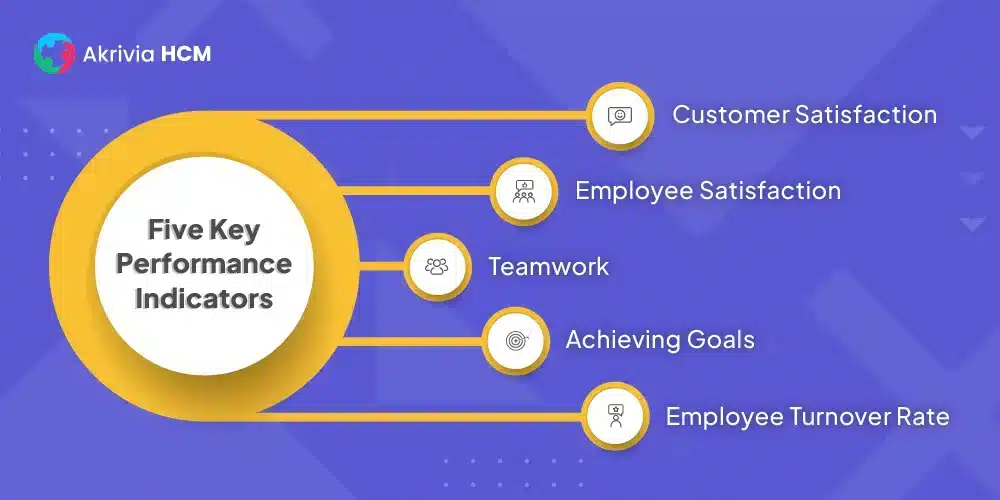
Once again, you can measure your success by setting KPIs for your personal and performance goals.
Setting another performance review with your direct manager would also be a good idea. This way, you will be able to determine what their high-level priorities for you are in the new job.
Make sure that these align with what you have in your 90-day plan so far.
As a new employee, your direct manager will be the best gauge to measure your overall success during the onboarding process. They will always have clear expectations of their new hires.
During these 90 days, they will be able to give you a better understanding of what they deem essential to their employees’ goals.
Remember!
During the interview, you must ensure that your 30- 60- 90-day plan is based on many hypothetical situations. Ensure you explain that you will better understand the company’s culture as a new employee.
The 90-day plan must be adjusted once you start in your new role.

When To Introduce the 30-60-90-Day Plan
Research shows that most people feel more relaxed and confident discussing their material and ideas in an interview.
So, if you have an opportunity at the start of the interview, tell the interviewer you have a 30-60-90-day plan you would like to share.
Most of the time, interviewers will be keen to hear your 30- 60- 90-day plan.
They may ask you to outline and explain it during the interview. This is an opportunity for you to take the stage, demonstrate your skills and knowledge, and drive the interview in your favor.
Discussing your 30-60-90-day plan with the interviewer lets them see you are a forward-thinker. And as someone who can think creatively and create value for the company.
Then again, the interviewer may have questions and topics prepared. In this case, you may not have the chance to introduce your plan until the end of the interview, when the interviewer invites you to talk about yourself or ask questions.
Introducing the 30-60-90-day plan at this point will give the interviewer a great insight into your personality. And your attitude, work ethic, and how you will fit into the company’s culture.
Alternatively, the interviewer may ask for your review plan after the interview.
However, the interview goes, you should always prepare a 30- 60- 90-day plan to offer your interviewer.
Top Tip
Remember to mention that your 90-day plan is written from the perspective of someone outside the company.
Without inside knowledge of company practices and resources, it’s unlikely that you will be able to put together the perfect 30-60-90 day plan.
You can therefore mention that your plan is based on certain assumptions.
More Quick Tips
Use these top tips to get the best out of your 30-60-90-day plan and get that new job you’re interviewing for.
Dos
- Gather relevant information from the company website or company employees, if possible.
- Include your personal, performance, and learning goals in each 30-day plan section.
- Be specific and avoid generic goals such as learning the company’s policies and meeting the team. Instead, outline how you intend to understand company policies and how you will become familiar with your co-workers.
- Study well-crafted 30-, 60-, or 90-day plan examples before writing your own. The link provided in this article has excellent examples.
- In your first 60 days, vigorously seek and fill skill gaps to show your willingness to contribute.
Don'ts
- Don’t write an essay, but don’t short-change yourself either. Each 30-day section of your plan should be approximately one page long, so the entire plan should be about three pages.
- Never write a standard 30-60-90 day plan and send it to every employer. You must write a customized plan for every job position and every company you apply to.
- Avoid generic statements. Your plan should demonstrate that you’ve done your homework and know what’s expected of an employee in the relevant position.
- Don’t be pushy. Do not try to insist if company employees are uncomfortable discussing their employer with you. Don’t be fussy about it.
Ace That Interview With A Winning Plan (Land The New Job)
Coming up with an excellent 30- 60- 90-day plan for your interview may seem like a Herculean task. But if you create a smart one, it can be a game-changer for your job search. And now you have that game-changer.
Here’s a comprehensive guide on how to wow hiring managers with your 90-day plan, arming you with the knowledge and tools to set yourself apart from other potential new hires.
Reflecting on your journey through this article, you will realize how much you’ve learned. You now know what the 30-, 60-, or 90-day plan is, how to write one, and when to discuss it during the interview process.
There’s no time like the present to apply this knowledge. You overcame the hurdles of securing an interview for your dream job.
By following the guidelines above, you are now equipped with the necessary tools to impress your potential employers, which you can do.
Formulate your 90-day plan with time and effort, demonstrating your skills and drive to succeed. Above all, be confident and enthusiastic when you present your strategy to the interviewers.
This is your time, and you are ready. Ready to impress. Would you be prepared to show your interviewers that they have no choice but to offer you the job? Your 90-day plan will demonstrate your value and make you stand out.
So nail that interview with a winning 30-60-90-day plan.
Meanwhile, learn how to write a resume like a pro.
Have you successfully used the 30-60-90-day plan in an interview?
Or are you looking for valuable examples of 30-60-90-day plans to inspire you?
Either way, the CVJury Team would love to hear from you. Contact us, comment, or sign up for an account.

